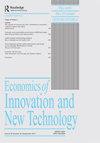Political failure: a missing piece in innovation policy analysis
IF 2.6
3区 经济学
Q1 ECONOMICS
引用次数: 0
Abstract
ABSTRACT Within the field of innovation studies, researchers have identified systematic failures that hamper investment in R&D, innovation, and growth. Accordingly, researchers in this field often seek to provide policy recommendations on how to alleviate these failures. However, previous discussions have often been lacking considerations to the risks of political failures, meaning that policies fail to achieve their stated goals in a systematic manner. In response to this gap, this article aims to illustrate the concept of political failure and its relevance for innovation research. This is done by both discussing how political failure can impact innovation policy and by reviewing the prevalence of any discussions of political failure among top-ranked journals on innovation for the period 2010–2019, a total of 7161 articles. The results show that consideration of political failure is scarce, with a small number of papers that have a substantial analysis of political failures. If the awareness of political failures could be increased, this could lead to better policy recommendations with a more nuanced discussion of the risks and limitations of public policy.政治失败:创新政策分析中的缺失
摘要在创新研究领域,研究人员发现了阻碍研发、创新和增长投资的系统性失败。因此,该领域的研究人员经常寻求就如何缓解这些失败提供政策建议。然而,以前的讨论往往缺乏对政治失败风险的考虑,这意味着政策未能以系统的方式实现其既定目标。针对这一差距,本文旨在阐明政治失败的概念及其与创新研究的相关性。这既可以通过讨论政治失败如何影响创新政策来实现,也可以通过回顾2010-2019年期间排名靠前的创新期刊中关于政治失败的任何讨论的普遍性来实现,共有7161篇文章。结果表明,对政治失败的考虑很少,只有少数论文对政治失败进行了实质性分析。如果能够提高人们对政治失败的认识,就可以通过对公共政策的风险和局限性进行更细致的讨论,提出更好的政策建议。
本文章由计算机程序翻译,如有差异,请以英文原文为准。
求助全文
约1分钟内获得全文
求助全文
来源期刊

Economics of Innovation and New Technology
ECONOMICS-
CiteScore
7.20
自引率
3.00%
发文量
30
期刊介绍:
Economics of Innovation and New Technology is devoted to the theoretical and empirical analysis of the determinants and effects of innovation, new technology and technological knowledge. The journal aims to provide a bridge between different strands of literature and different contributions of economic theory and empirical economics. This bridge is built in two ways. First, by encouraging empirical research (including case studies, econometric work and historical research), evaluating existing economic theory, and suggesting appropriate directions for future effort in theoretical work. Second, by exploring ways of applying and testing existing areas of theory to the economics of innovation and new technology, and ways of using theoretical insights to inform data collection and other empirical research. The journal welcomes contributions across a wide range of issues concerned with innovation, including: the generation of new technological knowledge, innovation in product markets, process innovation, patenting, adoption, diffusion, innovation and technology policy, international competitiveness, standardization and network externalities, innovation and growth, technology transfer, innovation and market structure, innovation and the environment, and across a broad range of economic activity not just in ‘high technology’ areas. The journal is open to a variety of methodological approaches ranging from case studies to econometric exercises with sound theoretical modelling, empirical evidence both longitudinal and cross-sectional about technologies, regions, firms, industries and countries.
 求助内容:
求助内容: 应助结果提醒方式:
应助结果提醒方式:


